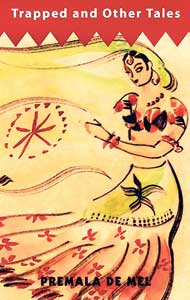
Getting into the characters and living their livesTrapped and Other Tales, by Premala de Mel. Reviewed by Devika Brendon. Published by Vijitha Yapa Publications. Price Rs.700 Premala de Mel has the gift of writing stories which make you interested in the characters: why they do what they do and think as they do. In her collected short stories, and particularly in the extended narratives ‘Trapped’ and ‘A Fine Cord’, she gives herself the scope to portray people whose background, cultural identity and extended family networks have created complexity in their lives, within which they act in ways that intrigue us.
I found myself interested in the characters' lives after their story had ended, which is a good sign, both in literature and life! De Mel has a range of diverse stories to tell, and is experimental in her chosen forms: their lengths, tones, narrative structures and points of view. Her use of the first person in ‘The Bridal Sari’, where the whole saga is told in the voice of an inanimate object, is a narrative risk: it distinguishes the viewpoint expressed from the predictable human perspectives depicted in more usual portrayals of the marriage ritual. The pure satire ‘The Rise of Citizen Amarapala' satisfies like a fable, and its sharpness and pointed succinctness match its subject perfectly: the portrayal of the kind of person most likely to succeed in the brazen world of politics. We follow an expected path with pleasure, but are also reassured by the reversal of our expectations. In ‘Trapped’, the moment at which Kareena, expecting rigid prejudice from her partner’s father, meets compassion and understanding instead, is a joyful and unexpected event which enables the characters to liberate themselves from their confinement in restrictive or oppressive situations. De Mel's portrayal of character is often cinematic: one can visualise her characters in a film or TV drama, and this ease of presentation enables us to gain a panoramic sense of society that reaches deeper than the social façades people often present to each other. We ask ourselves, after reading, if all the people we meet may have such interesting histories and experiences, and such complex decisions to make, and can thus see each other with a renewed vision. I particularly appreciated the positive arc of the stories: many of the characters move forwards in their lives in an invigorating and determined way, after facing great challenges. Many of De Mel's characters embody tolerance, compassion and wisdom which we can see has been gained through error and self-reflection. The spirited portrayal, in ‘A Fine Cord’, of Rakesh and Sophie who understand each other across boundaries of race and culture suggests that ‘a love of fun and a spirit of generosity' are really more important than the qualities conventionally looked for in marriage. All Immigration Officers should be like Mr. Dayasiri in ‘Love is Powerful’, who clenches his fist and, astonishingly, offers love. (Dr. Devika Brendon teaches English to secondary school students in Sydney, Australia. A writer of poems and short stories, she is currently working on her first novel, Largesse). |
|| Front
Page | News | Editorial | Columns | Sports | Plus | Financial
Times | International | Mirror | TV
Times | Funday
Times || |
| |
Reproduction of articles permitted when used without any alterations to contents and the source. |
© Copyright
2008 | Wijeya
Newspapers Ltd.Colombo. Sri Lanka. All Rights Reserved. |
